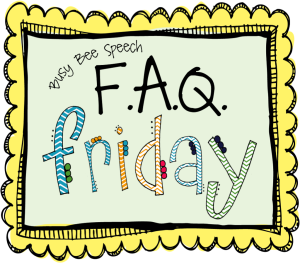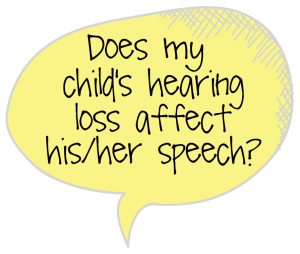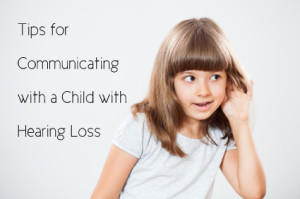Hooray for Friday! Is it too early to start counting down until the next vacation? Lol…I think ours is Fall Break in October. Glad I don’t have to wait until Thanksgiving for a couple days off!
Today’s question is all about hearing loss. I actually do have a couple of these types of kids on my caseload this year, and their parents usually wonder what effects a hearing loss has on their child’s speech.
Hearing losses can actually affect your child’s speech and language in several ways. According to ASHA, some specific ways a hearing loss can affect a child include:
- Vocabulary – Typically, vocabulary develops slower in children with hearing loss, as they often have difficulty with abstract and function words.
- Sentence Structure – Complex grammar is usually difficult for these kiddos, since they better comprehend sentences that are short and simple. They also often have a hard time hearing word endings and suffixes, which further complicates their grammar development.
- Speaking – Children with hearing loss often have difficulty hearing high frequency or voiceless sounds (like s, t, k, or f). This causes them to leave these sounds out when speaking, making it difficult to understand them. Other factors that could contribute to being misunderstood include not hearing their own voices when speaking, poor inflection, or poor syllable stress.
- Academics – Hearing loss can potentially affect all areas of academics, especially reading and math. The level academic difficulty varies and is influenced by several factors including the degree of hearing loss, parent involvement, and support therapies and services.
- Social Functioning – Kids with mild to moderate hearing loss sometimes report feeling lonely or isolated around other hearing children.
As an SLP, here are few tips on how you can help boost their communication at home!
- Always make sure you are facing the child and they are looking at you when you speak to them.
- Repeat or rephrase directions or information when needed.
- Minimize background noise during conversations (i.e. turn off a noisy fan or microwave).
- Use lots of pictures and visuals when you can.
- Make them feel comfortable letting you know when they have trouble understanding something. Always keep the lines of communication open.
Here are a few more fabulous articles on hearing loss and how it affects speech and language:
–This article by Vanderbilt Health lists the possible affects hearing loss can have according to the degree of the loss. Great read!
–HERE is an article by Gallaudet on the different types of hearing loss.
In this video, Audiologist Anne Oyler explains how even a mild hearing loss can affect a child’s speech and language skills.
Hope you found some of this helpful!














Leave a Reply